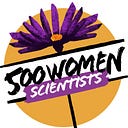
Meet The Scientist: Dr. Maha Samman
500 Women Scientists is thrilled to continue our Meet the Scientist blog series! In celebration of the International Day of Solidarity with the Palestinian People, we’re excited to highlight Palestinian women scientists who are both living in occupied territories and beyond. In this blog post, the spotlight is on Dr. Maha Samman!
Dr. Maha Samman is an Assistant Professor at the Architecture Department and lectures in Jerusalem Studies MA program at Al-Quds University (AQU). She is the author of Trans-Colonial Urban Space in Palestine: Politics and Development, Routledge 2013, and co-editor of the Ya Quds! periodical. She holds a Bachelor Of Science (BSc) in Architecture from Birzeit University, a Master of Science (MSc) in Urban Planning from the Netherlands’ Technical University of Delft, and a PhD in Political Geography from the University of Exeter (UK).
Samman won the Palestine Islamic Bank Research Award in the category of Distinctive Researcher in Palestine 2019, for her article The Production of Colonial Temporal Patterns in East Jerusalem in the Journal of Holy Land and Palestine Studies (2018). She has several other published articles in pronounced journals on Architecture, urban and political issues, especially about the city of Jerusalem. She received the Arab Council for the Social Sciences (ACSS) Research Grant (2018), for research on: “Geopolitics of “Time” and colonial temporal patterns in Jerusalem”. She was the head of the Housing sector in the Updating and Development of the Sectoral Development Plan of Jerusalem (2018–2022). She organized the multidisciplinary international conference: Production of Inequalities: Realities and Prospects for Change, AQU, in 2016.
1. When did you first identify as a scientist?
During the years of my Bachelor’s in Architecture, I started to learn how to do research, especially before designing any kind of building, on the social and spatial dynamics in the specific sites of the building. Although most of this research was for developing architectural designs, it was important to keep in mind what was happening in the everyday life of our cities.
I started doing extensive research during my MSc studies at the Technical University of Delft in the Netherlands. This developed and broadened during my PhD studies, after which my research experience and insight took form in various research topics which were published in different arenas.
2. What does your work focus on?
My research is inter- and multi-disciplinary as it intersects Architecture, urban planning, urban politics, urban and cultural heritage, social science and political geography. I work on the politics of urban space in its various scales within the colonial setting and with a focus on Palestine and more on the city of Jerusalem.
3. What’s the best advice you’ve received over your career?
While doing research, the cumulative advice I received covers the following:
- Keep at it, despite obstacles or setbacks.
- Focus on producing quality knowledge in a professional form.
- Keep goals high, on the local, regional and international levels, in case any one level is not encouraging for one reason or another.
4. How did the current climate in Palestine impact your ability to work as a scientist?
As a social and urban scientist and architect planner, everyday life in Palestine exposes the extent of the injustice under colonialism which compels scientists to communicate what is going on in Palestine, and especially Jerusalem, to the rest of the world. In my writings, I always try to unfold the realities of the colonial situation that impact Palestinians on the individual and communal levels.
5. When you’re not researching or organizing events to promote women in STEM, how do you relax and unwind?
I try to spend time with genuine loving friends and family, especially my children. I also try to exercise at least once a week, and to watch movies from time to time.
6. Is there anything else you would like to share?
I try to participate in community awareness and urban development with the context of municipalities and unions. I also have received awards for my research and managed to publish a book which develops a new paradigm in urban politics — the Trans-colonial.
[Written interview with Dr. Maha Samman was coordinated by Dr. Rana Dajani; Edits by Farah Qaiser and Rosie Dutt.]
